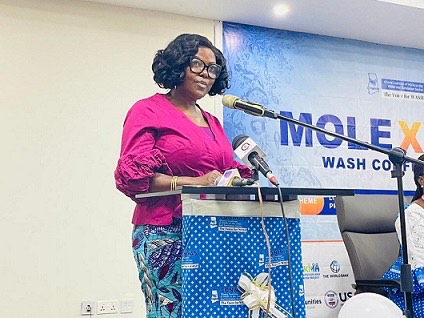By Franklin ASARE-DONKOH
The Minister of Sanitation and Water Resources, and Member of Parliament (MP) for Ayawaso West Wagon constituency in the Greater Accra region, Lydia Seyram Alhassan, has called for a holistic and unified front approach to combat the volcanic-like spread of illegal mining known as Galamsey destroying Ghana’s water bodies, forests reserves and farmlands.
“Enough of the political blame games. This is not a time to blame each other; rather, it’s a moment to unite all stakeholders—from government, opposition parties, traditional authorities, civil society organizations, and religious authorities.
Each of us has a role in addressing this national crisis, which demands a solution free from politics,” she cried.
According to the Sanitation Minister, posterity will judge us (Ghanaians) harshly if the citizens fail to act decisively to save our water bodies and forests.
Madam Lydia Alhassan shared these sentiments at the opening ceremony of the 35th annual Mole Water, Sanitation, and Hygiene (WASH) conference, held at the Volta Regional capital, Ho.
She reiterated the importance of a unified approach in tackling Ghana’s critical water and sanitation issues.
According to her, the 2024 edition of wconference, themed around Sustainable Development Goal (SDG) 6, serves as a platform to assess Ghana’s progress, pinpoint challenges, and create strategies for accelerated action.
She commended sector players for the achievements chalked within the WASH sector and highlighted the significance of key guiding documents, such as the Ghana Water Sector Development Programme (2021-2030) and the National Water Policy.
“Your expertise, dedication, and collaboration have been crucial in shaping the sector and advancing our national development goals. As we continue our journey toward achieving the SDGs, let this conference be a catalyst for action,” she said.
This conference the Sanitation Minister noted is more than a meeting; it’s a rallying call to implement our strategies and commitments effectively.
The Minister explained that achieving universal access to safe, sustainable WASH services aligns with both national priorities and global sustainability goals, adding, “Success in managing water and sanitation services, especially amid climate change, depends on our commitment to these policies and frameworks.”
Innovative Financing and Partner Dedication
Highlighting some financial challenges in the WASH sector, the Minister noted the necessity of innovative financing methods, including public-private partnerships, to bridge current funding gaps.
“We must consider all opportunities, including international private sector funding, to achieve our ambitious goals,” she urged.
On his part, the Paramount Chief of the Anfoega Traditional Area and President of the Volta Regional House of Chiefs, Togbe Tepre Hodo IV, who chaired the event also called for stakeholders to ensure that traditional rulers and grassroots partners play active roles in protecting Ghana’s environment.
“This conference opens at a critical time when we need to take a second look at our natural resource exploitation, as it is destroying our water bodies and threatening the health of all citizens,” he said.
The Paramount Chief of Anfoega Traditional Area commended the conference organizers and called for actionable proposals to address environmental degradation and water pollution, especially the impacts of galamsey.
The annual Mole WASH Conference series which is organized by the Coalition of NGOs in Water and Sanitation (CONIWAS), and supported by key partners like WaterAid Ghana, World Vision Ghana, Plan International Ghana, UNICEF, the World Bank, and Global Communities, among others is a Civil Society Organization (CSO)-led, multi-stakeholder platform aimed at reviewing sector performance, shaping policies, removing barriers, and promoting access to sustainable WASH services.
It also serves as a vital forum for collaboration, cooperation and implementation of sector policies.















